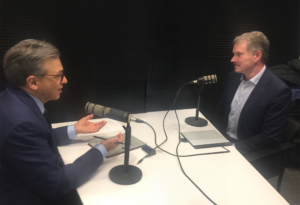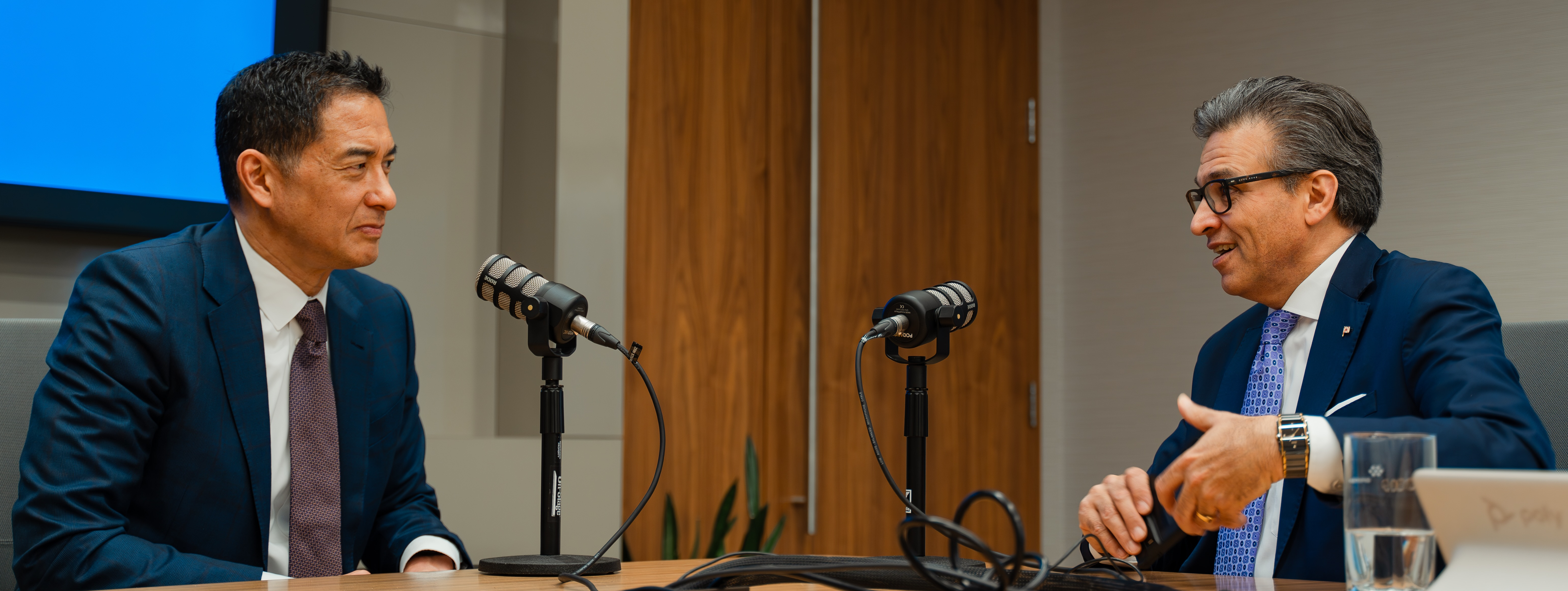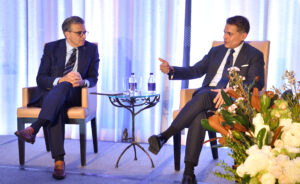Mike Katchen is Co-founder & CEO of Wealthsimple, a Toronto-based financial services startup.
In just five years, Wealthsimple has grown to more than four billion dollars in assets. And shortly after our conversation, the company announced another big funding round – the latest step on the road to an eventual public stock offering.
“I think we have a window of opportunity in front of us, as Canadians, to pull some of our best talent back and help Canada grow”
Michael Katchen
Goldy Hyder:
Welcome to Speaking of Business, conversations with Canadian innovators, entrepreneurs and business leaders. I’m Goldy Hyder, president and CEO of the Business Council of Canada. Today, we’re going to meet Michael Katchen, co-founder and CEO of WealthSimple, a Toronto-based financial services startup.
In just five years, WealthSimple has grown to more than four billion in assets. Shortly after our conversation, the company announced another big funding round, the latest step on the road to an eventual public stock offering. Not bad for a 31-year-old first-time CEO.
I spoke with Mike at WealthSimple’s offices in an old brick-and-beam walk-up in Toronto’s trendy West End. You might even hear a creaky floor or two, a sharp contrast to Bay Street’s glittering bank towers. Enjoy our conversation.
Michael, thank you so much for doing this. It’s great to see you.
Michael Katchen:
Thanks for having me.
Goldy Hyder:
I wish the audience could see the facility. It’s so different. Tell us about why WealthSimple is set up the way it is, and what is WealthSimple?
Michael Katchen:
Well, WealthSimple is a digital investment firm. We try to use technology and design to make investing simple for everybody. We’re set up here in an office in the West End of Toronto. It’s a brick-and-beam, three-story walk-up building. About 200 or so people here in this particular location.
Goldy Hyder:
Rustic feel, hardwood floors. Is there a ping pong table in here somewhere?
Michael Katchen:
Of course there is.
Goldy Hyder:
Of course there is.
Michael Katchen:
We wouldn’t live up to the expectations if we didn’t have at least one ping pong table.
Goldy Hyder:
I wish I was born again, to tell you the truth, to get to go through life with you.
Michael Katchen:
Yeah, no. We love it here. We’ve been here in this office for about a year and a half. We’ve outgrown it, unfortunately. So now, we have the daunting task of finding the next space. Toronto, for better or worse right now, has about 0% capacity. That’s a challenge for business like ours.
Goldy Hyder:
Well look, we jumped right ahead to what is. We should talk about how we got here. How old are you? Do you mind me asking that question?
Michael Katchen:
No. I am 31.
Goldy Hyder:
You’re 31. So you’re 26 years old, roughly, I guess, when this all started out.
Michael Katchen:
Correct.
Goldy Hyder:
Your friends are harassing you for financial advice, because you did a couple of degrees at Ivy. Your reaction to them was, “I’m going to start a company.” Is this how this all came about?
Michael Katchen:
It’s a little more organic than that. I love investing. My sister ended up actually getting me excited about investing at 12 years old. She randomly entered me into a stock picking contest that I went on to win.
Goldy Hyder:
Is this Jodi?
Michael Katchen:
This is Jodi, Jodi Kovitz, who founded Move the Dial.
Goldy Hyder:
I had the pleasure of meeting her the other day.
Michael Katchen:
Jodi is out there meeting everybody. She’s an amazing networker, and building something awesome in Move the Dial. She entered me in this stock picking contest at 12 years old that I went on to win. It inspired a lifelong love investing.
Fast forward many years, I was working in Silicon Valley in California. We sold the business that we were building, and a few friends made a little money off the deal that they wanted to invest. They knew I loved to do it, so they came to me for help. My advice was, “It is so easy to manage your own money, you should just do it yourself.” I built a model in Excel that showed you how to build a portfolio of ETFs, how to rebalance it …
Goldy Hyder:
Tell our listeners what ETFs are.
Michael Katchen:
ETFs are exchange traded funds, a really simple way to build a portfolio, generally low cost baskets of different stocks and bonds, that sort of thing.
My belief was I just wanted to empower this group to do it themselves. Their feedback was, “Mike, we love this approach, but heck, we’re lazy. Just do it for us.” That became the first insight. Here was this group that knew that investing was important but didn’t want to do it themselves. They didn’t want to hire a traditional advisor to do it for them. They wanted something else.
We’ve been iterating on that problem over the past five years. Today, we’re fortunate, we’ve grown the business. We have about four and a half billion of assets under management, about 150,000 clients across the country, and feel like we’re just getting started in terms of the opportunity that is to reinvent financial services for the next generation.
Goldy Hyder:
Take us through the journey. It’s only five years, so it’s not going to be a long story, but how did you get from where you were to where you are so fast?
Michael Katchen:
It’s been a whirlwind. It’s hard to piece together the journey. I was doing a talk yesterday at a startup that’s a couple of years behind us in its maturity. They were asking me about the first thousand customers, which really feels like it was yesterday, and, “How do we get our first thousand customers?”
I was talking about just the need for hustle. We used to do things like I used to have a policy where … You can imagine, in our business, one of the biggest challenges is trust. So for our first thousand customers, I’d go out and I’d pitch people on this great new idea of low cost investing, making it really easy with technology. The first question I would get was, “Well, great. How many clients do you have?” I would say, “Well, if you sign up, we’d have one.”
Nobody wants to be the first client in the business. So the first thousand clients was all about just outhustling our competition so that we would earn the trust of the clients that we brought on board. I used to do things like when someone would sign up on the website, I would try to call them within 30 seconds of sign up just to wow, just to create that.
Goldy Hyder:
Reassure them them that there’s a person there.
Michael Katchen:
Yeah. “Hey, this is Mike. I’m the CEO of the company. I just want to say thank you so much for signing up. How’d you hear about us? You have my number. If you ever have feedback or questions, give me a call. I’d love to hear from you.” It was funny, because yesterday, it took me right back to those moments of just doing everything we possibly could to fight for each client.
The business has evolved. We did a deal quite early in our life cycle with Power Financial, which has been a fantastic partner for the last four years or so.
Goldy Hyder:
That’s not normal territory for them.
Michael Katchen:
It’s not. We were the first of their now growing FinTech investment platform, a really bold move for a company like Power that manages some fairly large, more incumbent platforms in the investment and insurance industries. They’ve been great partners.
Their investments have enabled us to accelerate our efforts, where we’ve been able to build out a truly great brand and marketing campaign to scale up the business, and try and build that kind of trust with Canadians about what it is we do and how we help people invest.
Goldy Hyder:
When you decided to take the investment from Power Corp, obviously, the money is helpful, but was it also about validation?
Michael Katchen:
Yes. I think that, for us, as I mentioned, one of the biggest challenges in our space is trust. We sell trust. We thought that by having an institution that could command trust, because it had a lot of assets under administration or management …
Goldy Hyder:
And a long history and a brand.
Michael Katchen:
… exactly, we could borrow some of that, through association, that might help us establish trust sooner than we were able to earn it on our own two feet. So that was certainly one of the things that helped make that an obvious choice in partnering with Power.
Goldy Hyder:
How competitive is the industry for you?
Michael Katchen:
Our challenge is we operate in a very small piece of the industry. We get this report on a quarterly basis around market share. We have about a 70 or 80% market share of digital advice in Canada. Challenge is, digital advice is still such a small piece of the overall investment industry, which is a $4 trillion industry. So our job is to grow the heck out of this industry, and make sure that people understand it as a credible option, understand the benefits of it.
We spend a lot of time trying to think about how do we grow this industry, rather than we do about competition and what features or products they might be coming out with. Because ultimately, we don’t want to steal their clients. We just want to grow the industry as a whole.
Goldy Hyder:
Take us back prior to WealthSimple. Now, you moved down to Silicon Valley to work with a startup. For most Canadian entrepreneurs, that’s a one-way ticket. Yet, you chose to come back.
Michael Katchen:
Yeah.
Goldy Hyder:
Why? How? What do we need to know?
Michael Katchen:
Lots of reasons, personal reasons. I, at the time, was dating someone in Toronto. I had been doing long distance for years. When we sold the business in California, it came to a come-to-Jesus moment of, “Is this going to work, or are you going to stay in California?” So there was that wing.
Goldy Hyder:
We’ll need to make sure anybody who’s leaving Canada first has to find their significant other, and then they’re allowed to go get a job somewhere.
Michael Katchen:
Truly. Now, we’re married and have a wonderful daughter at home. So that worked out really well.
But also, I was observing, from a distance, what was happening in Canadian tech. I was really inspired about what felt like a moment in Canada where there was a cohort of companies that were getting to a size and scale that we hadn’t seen in years. It wasn’t one company. It wasn’t just RIM. It wasn’t just Nortel. There was a cohort, several different businesses that seemed like they were on the verge of exploding.
It was the start of people seeing Canada as a credible place to invest. International VCs looking at Canada. Talent was just becoming a topic, the kind of talent being produced at Waterloo and Toronto and in Montreal. I wanted to be a part of that.
I’m a proud Canadian. I think that Canada is one of the greatest places on the planet. I think that we have a lot of challenges in our future. It felt like, as someone that cares about this place, and with the platform or the opportunity in tech, now would’ve been a great time to come and be a part of that and build a business based in Canada that could participate in that transformation.
Goldy Hyder:
A, we’re glad you found your partner in life that you did, because that’s clearly the reason you’re here, but B, we’re glad you love the country as much as you do and you came back. Do you think there’s a big cultural difference between Silicon Valley and Canada’s tech sector, or is that changing now?
Michael Katchen:
It is changing. I would say it’s not changing fast enough. I still worry that Canadians aren’t ambitious enough.
One of the coolest things, as I think about my time in San Francisco … San Francisco has got all sorts of problems today. Don’t get me wrong. But one of the coolest parts is you go out to a bar or a restaurant in San Francisco, or a coffee shop, and everybody there is working in tech. Someone founded a company on your left. On the right, they’re working at Google or Facebook, or a million other really cool startups, or scale ups, or large companies doing really innovative work. They’re talking about changing the world, and they’re naive enough to think that they can change the world. The coolest part about it is the number of companies that are actually doing it.
You come to Toronto or Vancouver or Montreal, we don’t have the same sort of conversations about how are we in Canada going to change the world or build global changing companies. I think we need more of that. I think we need more of what I like to call naive ambition in this country. People that are crazy enough to think that they can do it, because a few will actually get there. The companies that they build will propel our prosperity as a nation for years and decades to come.
Goldy Hyder:
What’s that saying about shoot for the moon and land on a star?
Michael Katchen:
Something like that.
Goldy Hyder:
Well said. Let’s talk a little bit about WealthSimple’s growth trajectory, because again, it’s just not a long history here. Despite the fact it’s only been five years or so, you’ve already diversified into the United States and the United Kingdom. What made you do that so early?
Michael Katchen:
Part of this belief that Canadian companies I think settle for being Canadian companies, and I think we need to build more global champions in Canada. One of my favorite books on this topic is Why Mexicans Don’t Drink Molson. It talks about seven or so different industries across Canada where we have all the ingredients to build global champions and yet somehow we haven’t figured out the recipe.
We don’t want to follow that same narrative. We want to build a global champion based here in Canada. We think we have the opportunity. We think that we’ve aligned ourselves with a partner that has global operations, with Power Financial.
We think that the industry is changing along the same lines across these three markets, where technology is becoming increasingly important. You’ve got massive demographic shifts in who the clients of the future are going to be. We think that a lot of the same themes around building a human brand and a really simple product that builds trust in a new kind of way with consumers is translatable across those markets. So we want to take that, and we want to really build something that changes the landscape across those three countries.
Goldy Hyder:
Now, you’re not just an innovator and a disruptor. You’re now the CEO of an organization that you’ve built, which makes you a leader. Were you ready to be a leader? What makes you the leader that you are?
Michael Katchen:
I don’t know that I am. I tell everybody on their first day at WealthSimple that this is my first time as a CEO, and I’ve never done this before, and I need a lot of help, and I work hard every single day to try to earn the seat that I’m in, but that we’re in this together.
I think my approach around leadership in general, and I think the philosophy I’ve tried to take as a first time CEO building a company, is to try to be humble and confident at the same time. I think, as a leader, people look to me to have a perspective, have conviction, but I don’t have all the answers. So I need to have an open mind, and remain humble, and know that we’re just getting started. I think that that’s a trait I try to cultivate. It’s a trait I admire a lot and other leaders that I look to partner with.
Goldy Hyder:
Tell me who. Who do you look up to?
Michael Katchen:
Many. I think someone that we’ve just recently brought on board that I like to show off as an example at the company is a guy named J-F Corville. J-F was the former COO of RBC Wealth Management. He had, I think, no fewer than 2,000 people reporting to him for the better part of a decade. On day one at WealthSimple, he had two.
Goldy Hyder:
He doesn’t have to wear a suit anymore, so there’s an upside.
Michael Katchen:
There’s definitely an upside. No dress codes here, for sure.
Goldy Hyder:
His clothing budget [inaudible 00:13:57]
Michael Katchen:
I think it takes a certain type of special leader, who doesn’t have the ego around that, and is willing to step into a role and roll up their sleeves and just do what it takes to build the business. I really admire that.
Goldy Hyder:
What are you learning from him?
Michael Katchen:
Lots. I think one of the challenges we’re facing as a business, we’re about 250 people in the company now, and like you said, we’re five years old, and so we’ve had to build culture on the fly. We don’t have decades of cultivating what this place is all about under our belts.
Goldy Hyder:
Ping pong table helps.
Michael Katchen:
Ping pong table is part of it, but a culture a ping pong table does not make.
I’ve learned a lot from him about scaling, about what leadership looks like at scale, especially around communication and stakeholder management. That’s becoming an increasingly important part of our business. Given that we now have a lot of clients, we have a lot of assets, so things like regulators, things like shareholders that have given us a lot of capital, and a big team are all really important constituents around the business. Finding the right way to manage that set of stakeholders is really important.
Goldy Hyder:
You reference the importance of communications being a very big part of being a leader. Tell us more about how you’re using communications as a tool and as a tactic, or perhaps even a strategy, to build a team that you’re building and to provide them the leadership that you are.
Michael Katchen:
We think communication is something that we stand out for, both in our brand communications and internally. We try to use it as an opportunity to reinforce, more than anything, the purpose of the organization.
One of the things I’m most proud of that we did last year was we took our brand team, which is usually working on our ad campaigns that we’ve been fortunate to win all sorts of awards for … We do all that work in house, because we think it’s such an opportunity to create a new kind of brand in financial services that is human and relatable, and all about great lifestyle. We actually turned their attention to internal communications.
We had them help produce what we call our culture manual, which was trying to codify our company values, how we work and why we exist, with the same quality and attention that we would give to an ad campaign that would run during the Super Bowl. I think that that was one of the biggest moments of pride and most effective tools we’ve ever built for communication, because we’ve now got a common language around things like purpose and values.
Goldy Hyder:
Especially with international locations now.
Michael Katchen:
Absolutely. And we have a piece of work that’s shareable and consistent. So we always know people are on the same page. We invested enough that people feel really good about it. They want to show their family and friends. It’s actually worked as a great recruiting tool for that purpose as well.
I think that’s one of the things that we use is we try to treat communications with the importance it deserves, and with the polish that we think that we’re able to with the capabilities we’ve built here.
Goldy Hyder:
Now, we’re talking about people. As I travel the country and meet with businesses, our members at the Business Council of Canada or others, people issue seem to be paramount. What challenges are you facing in terms of finding talent?
Michael Katchen:
It’s the thing I spend the most time on right now is talent recruiting. It’s hard. It’s really hard. I would say that, for us, the biggest challenge I’m facing right now is the scale at which we’re growing the company and the team.
I’d love to hire people that have lived through this before, so that we can avoid making the mistakes that maybe they’ve lived through at other organizations. There aren’t that many companies in Canada that have scaled at this pace. There are a few, but the talent pool is much narrower than it would be in other places like in Silicon Valley.
So we’re now just starting to enter this phase of actually trying to bring talent that maybe isn’t locally based back to Canada or to Canada to help us fill those really hard roles or really hard experiences. We actually just hired a new chief people officer who’s joining us from Netflix out of LA. I’m thrilled. It’s the first person we’ve actually pulled in from California. I think we hope to do more and more of this.
Goldy Hyder:
How’d you do it? What was the pitch?
Michael Katchen:
Luckily, she’s an expat, so I think for personal reasons, loves the idea of coming home and being in Canada.
I think what’s funny is in the last two months, the number of inbound calls I’ve had from expats, that are in really exciting roles at the highest growth technology companies in the world, that are seeing what’s happening in Canada, and a little disenfranchised with what’s happening elsewhere. It’s created this opportunity when people are starting to seriously consider being a part of the Canadian story and wanting to help build a great Canadian champion. So I think we have this window of opportunity in front of us, as Canadians, to pull some of our best talent back and really help us grow.
Goldy Hyder:
Well, that’s very encouraging. What do you think is attracting them, and what are you doing to keep them when you get them? Because in today’s world, everybody’s seeking talent.
Michael Katchen:
There’s a lot of talk these days about the opportunity for Canadians to attract US because of perhaps people’s misgivings around the US or whatever.
Goldy Hyder:
The political situation, the guns, whatever it might be, but those could be moments in time.
Michael Katchen:
Totally. My feeling is that the only way to do this sustainably is to create really exciting companies. I talk about Waterloo. How did Waterloo become what it is today? Such an awesome innovation center and talent pool. It wasn’t because someone decided that Waterloo should be that. It’s because RIM at its heyday was the most exciting company in the world to work for. If you rewind the clock, you remember when BlackBerry was the most exciting company in the world. That’s how you create talent engines, by building companies that are exciting places to be.
Goldy Hyder:
Magnets.
Michael Katchen:
They become magnets for talent from all over the world, where the best and brightest want to come be part of this story. So I think you need to have a really great story to tell, and I think we have a fantastic story to tell in Canada. It’s only getting better, and lots of different companies are starting to tell that.
We, as a place to live, as a place for your family to be, we have lots of great things going for us in terms of our story. Now, it’s up to us to live up to it and create the companies that continue to be magnets for talent and only amplify that message.
Goldy Hyder:
Now of course, part of the reality of running a business is you’re regulated. Your stakeholders include government. How are you finding the regulated environment in Canada? We always hear that we’re overly regulated. But now you’ve got operations in two other countries. What’s your experience vis-a-vis at least UK and US?
Michael Katchen:
It’s challenging. There’s no question. I would say I think that there are really meaningful differences between the three countries from a regulatory standpoint. I always like to think that the US and the UK are on opposite ends of the spectrum, and Canada somewhere in the middle.
The US, there is actually so little oversight, it’s kind of scary how fast that you can get a license to do things, but if you mess up, it is incredibly punitive. You go to jail. You get fined a ton. So for me, I’ve always defined the US as a punitive regulatory environment.
Whereas the UK, there is so much oversight, there is so much red tape to getting approvals and getting through [inaudible 00:21:16] that it’s preventative. It’s hard to mess up, actually, in the UK. I find that those are actually quite interesting different approaches, punitive versus preventative.
I think Canada is somewhere in the middle. We have a little bit more of an oversight, I think, model than the US does. But I think the one thing that Canada has going for it from a regulatory perspective is how approachable our regulators are.
It’s hard to pick up the phone and call the FCA, the CEO of the FCA, and talk about the future of blockchain and AI, and the implications for capital markets. Maureen Jensen and Pat Chaukos are out there in the community trying to understand the impact of these technologies. They’re trying to get ahead of it. They want input and feedback.
Goldy Hyder:
Canadian regulators.
Michael Katchen:
These are the Canadian regulators, the CEO of the OSC and the head of their launch pad, which is their innovation arm that they’ve launched, to try and get ahead of these things, and really be collaborative with industry on what the right way forward is for regulatory relations.
Goldy Hyder:
Do you believe governments might get more involved in the industry in terms of oversight and regulation, or will they keep the equilibrium that you’ve identified? I mean, look in the news. The data, the privacy, the security, the cyber, the hacking, the things that are dominating the news these days, that are likely to drive public angst, could create regulations whether they were targeted at you or not.
Michael Katchen:
For sure. We saw that first with GDPR in Europe last year. I think right now the sentiment right now is for sure with respect to all the challenges that Facebook has run into over the last year, that there will be some form of regulation that comes into the social media and the technology industry like it hasn’t before.
In general, I think that’s a good thing. As a highly regulated financial services firm, I’m someone that believes that regulation has a place, and I think can be constructed well. I guess what I have learned as a highly regulated financial services firm is there’s a downside, and there are ways to do regulation wrong.
I think the only advice, and I’ve given this directly to government, is that a rules-based system is really hard to get right, because rules that might feel right today quickly become antiquated when the thing that matters most is you get the principles.
Goldy Hyder:
Principles right. Correct.
Michael Katchen:
That’s one of the challenges of the securities industry which we operate is there’s a lot of rules. For instance, when we launched our business, there is such a rule that we have a responsibility, as what’s called a portfolio manager, to make sure that when we put clients in a portfolio, it is suitable for their needs, for their risk tolerance, for their goals. That makes total sense.
But the rule was that the only way to assess a client’s needs was to do it in a face-to-face conversation. Hard to do that as a technology company. Hard to do that if you’re a young professional that doesn’t want to meet an advisor face-to-face. So we had to spend a lot of time educating regulators about why that rule didn’t make sense. Originally, we had to get exemptions from the rules, and then over time, actually had to get things changed.
That’s the challenge of rules, whereas the principle of make sure clients are in suitable investment portfolios for their needs, you can meet that in a whole myriad of different ways. That’s the key to get right.
Goldy Hyder:
Now, we’re getting a good feel for who your customers are, but I want you to talk about who is your target customer, and are millennials really any different than the rest of us when it comes to saving and investing?
Michael Katchen:
What’s funny about our business is, as we’ve grown, we cover a much broader set of clients out there. I think our youngest client’s 18 and our oldest client now is 102. So a pretty broad segment of investors.
We skew younger. I think about 85% of our clients are under 45, which is probably the inverse of the investment industry. So we are really capturing the next generation of clients out there.
I do think that the needs between millennials and young professionals and older investors are different. We’ve had to evolve, as we’ve started to get more and more close to retiring clients, to meet those needs. Your needs change from the desire to save and invest, maybe buy your first house, maybe start setting up a college saving fund for kids, to, “Am I going to outlive my savings when I retire? Am I going to be able to retire? Do I have the proper inheritance set up,” if you’re in such a fortunate position to think about what you might be able to pass on to the next generation. Needs do change, and we’ve had to evolve the sophistication of our offering to cater to a more mature audience as our business has grown.
Goldy Hyder:
Let’s pivot back a little bit about the journey here again, because I want to cover off whether this was a straight line or did you have adversity. Did you experience setbacks?
Michael Katchen:
There have been a lot of challenges and setbacks.
Goldy Hyder:
What was your worst day in this?
Michael Katchen:
This might be another cute story of hustle as you try to start something. When we launched the business, there’s a very important part in our business that’s behind the scenes, people don’t see, which is called a brokerage or a custody platform. It’s where money that people invest with us actually sits, and where we trade on stocks and bonds on your behalf, that sort of thing.
When we launched the business, we didn’t do any of that ourselves. We had to partner with another company that provided those services. We wanted to launch this totally digital, really simple to use investment platform, but the partner that we had to work with in the backend required paperwork to open up accounts for clients. They refused, when we tried to launch the business, to enable us to open up accounts digitally.
So what we had to do, when we tried to open up accounts for clients every day, was at the end of the day, my co-founder and myself would sit down at a computer and print off every application we got that day, from sometimes tens or hundreds of clients, and sign them, and then drive them out to our back office partner so that they would open up the accounts for us in the morning.
This is a totally non-scalable sort of thing. When you’re not dealing with technology, actually a lot can go wrong and a lot can break, because paperwork gets lost and clients get angry. I just remember so many angry phone calls in those early days, when things went wrong, that there were moments of doubt, like are we ever going to be able to create the sort of experience that we aspire to?
Ultimately, we found out that the only way to solve this problem was to buy our own brokerage. So we acquired a company and spent six months trying to totally reinvent the back office around what it takes to support a business like ours. Thankfully, that’s not an issue anymore, but there was some pretty dark days, a lot of angry phone calls in those first few months.
Goldy Hyder:
What are the major challenges that you’re facing today to take WealthSimple to the next level, and what is that next level look like?
Michael Katchen:
The thing we struggle with the most right now is there are so many opportunities in front of us. Picking the right ones. I think our biggest challenge is going to have to be focusing on the few places where we can actually win.
An example, in the last year, we launched two new product lines, a savings account and a trading account. The trading account, within four weeks of us launching just a waiting list online, the product didn’t exist yet for it, we had over 120,000 people sign up. So that’s our challenge is balancing the excitement around all of the opportunities in front of us and the need to focus to get things right.
Goldy Hyder:
It’s all privately held today. Do you see a day that you go public?
Michael Katchen:
Yeah. Explicitly, that’s our intention. We want to create the next great independent financial services business in Canada. A public offering would be the best way to achieve that.
Goldy Hyder:
In the meantime, if somebody came up, and maybe they already have, knocked on your door or sent you an email and said, “Hey, Mike, we’d like to buy,” has that happened?
Michael Katchen:
Listen, I think, in some ways, we’ve sold a majority stake in the business to Power. The reason that we did that was because they were aligned with what our vision was for the business that we wanted to build.
Goldy Hyder:
You were able to scale up pretty quickly with capital investment that would’ve taken a long time otherwise.
Michael Katchen:
For sure, for sure. I think one of the unique things about Power is, despite being this large publicly traded company, it’s a family controlled enterprise. What’s unique about that is the long-term thinking that it affords to partner with a family that can have a very long-term view to the businesses that they want to support and build. So they’ve been a wonderful partner to us.
Goldy Hyder:
How did that come about?
Michael Katchen:
The partnership with Power?
Goldy Hyder:
Yeah. How did you meet them? How did that come about? Now, full disclosure to our listeners, you’re a next-gen, next-generation leader, next-generation member of the Business Council of Canada. Obviously, Power and others that you interact with are represented there as well. Did it come through that, or did you know someone separately? Did they cold call you?
Michael Katchen:
I was introduced to Paul Desmarais III …
Goldy Hyder:
Your board chair.
Michael Katchen:
… who’s now the chair of our board, maybe the week we launched the company. The person who introduced us was Som Seif …
Goldy Hyder:
I know Som, of course.
Michael Katchen:
… who was one of our very first investors.
Goldy Hyder:
Purpose.
Michael Katchen:
The founder of Purpose, an ETF pioneer in the country. He introduced us just … “You are two young people in finance with some big ideas about the future. I think you’ll enjoy meeting.” No context. No need or no, “Hey, there’s a deal to be done here.” Just, “I think you guys will enjoy each other.”
Goldy Hyder:
Did you do your homework on who Paul was?
Michael Katchen:
Yeah, yeah. Most people, I think, operating in the financial services would have some idea.
Goldy Hyder:
Prepared hard for that meeting, did you?
Michael Katchen:
I did. I did. We hit it off. We had a great meeting. We realized we had a lot of shared ideas, excitements around the opportunities in financial services over the coming years. We decided that we’d just check in every so often. So every month or so, when Paul was passing through Toronto, we’d grab a breakfast or a coffee or something.
After about six months of dating, Paul came to one of these meetings and said, “Hey, Mike, we both see this industry evolving in similar ways. You’ve got the team. We’ve got the capital. Why don’t we figure out something to do here together?” It took six months to hash out a deal, because these things are complex, but ultimately, decided that there was a path.
Goldy Hyder:
No doubt lawyers were involved.
Michael Katchen:
Yes.
Goldy Hyder:
That’s how they got complex.
Michael Katchen:
No kidding. Really, it was a very organic thing. I think a lot of credit to Paul, because this is a difficult thing to support. At the time we had, I think, less than 10 people on the team, maybe a thousand clients. Far from a proven business. They were prepared to commit a significant amount of capital to scale up what was really just an idea with some proof points, but had a lot more unproven than proven at that stage.
Goldy Hyder:
You mentioned the role that leaders play in building teams. How important was the team in your ability to get an investor like Power to really go all in the way that they did? Because it’s about leadership, it’s about the product, but these days, it’s also about the talent.
Michael Katchen:
It’s all about the team. I think that why Power made the original investment in WealthSimple was the realization they probably couldn’t hire our team. Because the sorts of folks we were able to recruit, they don’t want to work at a big insurance company. They want to work at a startup that’s trying to change the world, that’s trying to do good, that’s trying to build … will something into existence.
The excitement and the fear that comes along with that experience is different than what you get in a large corporate environment. I think that’s one of the opportunities of partnering with firms like us, from a big incumbent standpoint, is the opportunity to tap into a talent pool that may not be interested in going to work.
Goldy Hyder:
Because you said this, I’m going to ask. Do you think they find it ironic now that technically they are working for a big … because the investment is from so large of an investment from Power?
Michael Katchen:
I think what’s really important, and Power’s been very good at this, is ultimately, our ambition is to take the business public. We still make it very clear that every employee at WealthSimple has equity in the business. We make option grants to every single person who joins the company, so that they feel like and are owners, and operate like owners with the same upside opportunity that would come with joining another startup out there that isn’t controlled by a large corporate. That’s been really important for us to preserve, so that we can continue to hire the kind of talent that we need to scale this business. That’s something Power understands and has been a good partner to get with.
Goldy Hyder:
What advice would you have for young entrepreneurs? Not that you’re an old one, but you’re a veteran at five years now. What would you say to yourself if you were, rewind five years, that you need to do to be successful?
Michael Katchen:
I think that what I’ve learned in the last five years is there’s only really a few things that matter. You got to latch onto a real problem and have a solution for it. That’s this concept of product-market fit. I find that, as you scale, it gets more and more tempting to get back into …
I started my career in consulting, where you approach problems as-
Goldy Hyder:
You were at McKinsey, right?
Michael Katchen:
Yeah. Where you approach problems as market opportunities. Here’s this big giant market. There’s got to be something in that that we could capture. That’s not a customer problem. The customer problem is an N of one. It’s best if you, yourself, are the person facing that problem.
So one of the challenges I try to keep us very aware of, as we scale, is staying close to the problem. We’re all customers ourselves of WealthSimple. We are all customers of the new products we launch. We understand them deeply. We want them for ourselves. I think that’s a really important lesson that I’ve learned is, A, understand the problem, and then B, launch the simplest possible way to solve it.
For me, I told you the story of the spreadsheet. The spreadsheet was the simplest solution to help people invest. If I had approached the problem as, “Hey, I want to start a financial services business that helps people invest,” I would’ve said “No freaking way. I’ve never worked in this industry. I don’t have any of the licenses required to manage money. Where does the one even start to do this?”
Goldy Hyder:
What’s your value proposition? What do you even know?
Michael Katchen:
So we started with a spreadsheet and we got feedback. That feedback was valuable insight that let us iterate. We’ve kept … We keep on iterating. We’ve been iterating ever since.
We tell this funny story that we were fortunate, a few years ago, we won what’s called a Webby Award, which is like the Oscars of the internet, as the best financial services website in the world. I think if most companies run won that award-
Goldy Hyder:
Really? Say that again. You’re the best financial website company in the world?
Michael Katchen:
Yeah, yeah.
Goldy Hyder:
Wow.
Michael Katchen:
It was really exciting. It’s a whole New York based award ceremony, red carpet, star studded [inaudible 00:36:16]
Goldy Hyder:
Fantastic. Congratulations.
Michael Katchen:
Thank you very much.
Goldy Hyder:
That’s a big deal. I’m impressed.
Michael Katchen:
It was fun.
Goldy Hyder:
I don’t impress easily, by the way. That is very impressive.
Michael Katchen:
Well, thank you. It was certainly a lot of fun. I think if most companies were to win that kind of an award, what they do is they maybe even change the homepage of the website to say Webby Award winning website. They tell their design team, “Congratulations. Now, don’t touch a pixel. It’s award-winning. Keep it award-winning.”
What do we do is, the next day, we went to our design team and said, “Awesome. Tear it down and start again.” We did. We designed it from scratch. The next year, we won the award again, with a brand new website, as the best in the world.
That’s a mindset that there is no such thing as good enough or done. You can always do better. You have more data, more insights. The only way to keep ahead of the curve is to keep reinventing yourself.
Goldy Hyder:
What you just said applies to countries too, I think. One of the criticisms of Canada is that we are a comfortable country, that we’ve taken settling literally, to some extent. Are you the next generation that’s going to change that for us? Are you the ones who are going to make us compete?
Michael Katchen:
Well, I think there’s a lot that has to change about Canada. I mentioned earlier in this chat that I am nervous about our future. If you think about Canada today, and so much of the prosperity we enjoy really comes from two industries. It comes from, we’ve talked about this …
Goldy Hyder:
Yes, we have.
Michael Katchen:
… pulling things out of the ground and financing that work. Those have been great engines of growth and prosperity for the country for many years. But that cannot be the story we tell ourselves in 20 years from now. The world is changing so fast, we need to be able to keep up, and we need to diversify our economy, much more so than it is today, into a broader set of industries.
Goldy Hyder:
Yeah. The whole tangible, intangible economy.
Michael Katchen:
Absolutely. I talked about Why Mexicans Don’t Drink Molson. Here are seven industries, or however many the book talks about, where we could be global champions and we have not made it work.
Goldy Hyder:
Why do you think that is, still, at the core? What is it?
Michael Katchen:
I think that there’s lots of reasons. I do think that Canadians have played safe for a long time, both in mentality, that we like to play it safe. We don’t like to step on toes. We don’t need to take too much risk. I think the government has created a safe economic environment in Canada for certain industries that don’t have necessarily as much international competition as maybe other countries would experience. And I think in general, there’s this Canadian mindset we talked about before of are we ambitious enough? Do we want to win?
I think that there have been moments in the last 10 years where we have wanted to win, and it’s been exceptional. My favorite is, I guess it’s a little more than 10 years ago now, but the Vancouver Olympics, where we set out a program to own the podium. We said, “We want to win the Olympics. We want to win on the global stage.” And we did. We won.
Goldy Hyder:
Yeah, we did.
Michael Katchen:
It felt great. It was so un-Canadian, but it felt great. We proved to ourselves [inaudible 00:39:15]
Goldy Hyder:
As that joke goes, the one day we acted like Americans.
Michael Katchen:
I think that we don’t have to confuse winning with sacrificing or compromising on Canadian values. I don’t think that there has to be some trade-off between winning and being humble, or wanting to win and being humble. There’s a difference between bravado and arrogance, and saying more than what substance would suggest.
Goldy Hyder:
Correct.
Michael Katchen:
Whereas I think that we can do it in the Canadian way. Let’s win, but let’s have substance to back it up. I’d love to see more of us have that ambition. I think we need it, as a country, to continue to prosper in the future.
Goldy Hyder:
Well said. Very inspirational. Thank you for that.
Now, you have been seen to be a disruptor. Your business is seen to be a disruptor to some of the traditional institutions that you’ve mentioned. Do you worry about disruption coming at you? What are you doing to manage that?
Michael Katchen:
I guess my view is I actually don’t like being called a disruptor. My view is technology is an enabler. Those that embrace technology will continue to thrive.
One of our big and growing parts of our business is this platform that supports traditional financial advisors that meet face-to-face with clients. The industry loves to say that we are disrupting them. We are enabling them. We’re building technology tools to support advisors to thrive in the 21st century.
So for me, so long as we continue to have this mindset as what are the things that will enable our business in the future, and not be afraid of them, but embrace them, we will continue to thrive as a business, in the same way that, I think, advisors that embrace technology will continue to thrive.
Goldy Hyder:
All right. Look. Before we wrap, I want to get to know you a little bit better than just the business guy, and the startup guy, and entrepreneur. Tell me how you relax.
Michael Katchen:
These days, there’s not too much time for it, with the business, but I try to make a lot of time for my family. I mentioned I have a young daughter at home and a wonderful partner.
Goldy Hyder:
How do you find the work-life balance?
Michael Katchen:
To me, we actually stopped talking about work-life balance at WealthSimple and replaced it with the concept of work-life fit. I love to work. I hate this concept of you have to choose …
Goldy Hyder:
Either/or.
Michael Katchen:
Either/or. I choose to work a lot, but I fit the things that are really important and I value into my life. That’s a personal decision. I think that everybody has to figure out what that means for them.
For me, that means finding time for family. I try to leave the office these days at 5:00, four nights a week, so that I can put my daughter to bed, and I can feed her dinner, and we can hang out before she goes to sleep. Then I work again after that at night. Whereas before she was born, I used to eat most of my meals here at the office and work late.
Outside of that, what do I like to do when I relax? One of my biggest hobbies and passions in life is canoeing, of all things. Very Canadian. I love canoe trips. Getting out in the park, like Algonquin Park, for a few days, totally disconnected is my happy place. So as often as I can, get up to a lake on a canoe, that’s my favorite thing.
Goldy Hyder:
What one word describes you?
Michael Katchen:
I think people describe me as nice. How Canadian is that?
Goldy Hyder:
How Canadian is that?
Michael Katchen:
I value that, though. I think that-
Goldy Hyder:
It beats the alternative, doesn’t it?
Michael Katchen:
I remember a very poignant thing from me was, when I was in grade school, I won an award, which stands out for me, as it’s an elected award, your classmates vote on it, as the Mensch of the Year. Mensch is a Yiddish word that literally just translates as man, but it generally means a nice person, a good person.
It stands out for me because my grandmother, who was a very important influence on my life and passed away many years ago, the look of pride on her face when I won that award is something that stands out to me as one of the most important accomplishments of my life.
I’ve always taken that as a very important thing. When you leave this world, there’s only one thing you take, and this is what she would always teach me growing up, is a good name. Having a good name and being a nice person I think is a very important thing.
Goldy Hyder:
Nothing beats the wisdom of our grandparents, does it? I heard the same thing.
Now, you said something that I’m going to call you out on a little bit. I’m curious. We’re just getting to know each other still. This is our second or third meeting. You said, “I’m a nice guy, and I got awards for being a nice guy way back in school” A mensch, you said. Yet, you’re very competitive. You don’t even care about your competition, but you’re very competitive, and you’re very driven. How do we square that circle?
Michael Katchen:
Yeah. Don’t let the nice guy fool you. The other award I won is the Hustler of the Year on all the sports teams. I was never any good to win the MVP. I was never good enough at sports, but I always outhustled everybody, because I like to win. I don’t think that there’s a problem with winning graciously.
Goldy Hyder:
Or winning nicely.
Michael Katchen:
Or winning nicely. It feels great to win. I think that being hungry to win is a really important component of being a leader and an entrepreneur.
Goldy Hyder:
What gives you the biggest rush?
Michael Katchen:
These days, one of the coolest things in the business is from the business. It’s when something happens that I have nothing to do with. I love seeing the team win, and just being surprised because it was either some new product or new feature got shipped and I had no idea it was coming [inaudible 00:44:35]
Goldy Hyder:
Look at your face light up. How genuine of a response is this? That’s great to hear.
Michael Katchen:
It’s just a really cool feeling to see that, to see how unimportant you are, but how cool your team is and how capable they are. I think that’s one of the coolest experiences.
Goldy Hyder:
Do you describe yourself as an introvert or an extrovert? What are you?
Michael Katchen:
I’m an introvert, for sure.
Goldy Hyder:
It’s amazing how many leaders are. Why do you think that is?
Michael Katchen:
I don’t know. I think there are different kinds of leaders. I often get asked what kind of founder or CEO am I. I generally see there are two kinds of archetypes that I’m familiar with. There are the Steve Jobs and Elon Musks of the world that are often the smartest person in the room. You walk into a room, you probably think they are, and it’s made known that they’re the smartest people in the room.
Goldy Hyder:
If not, they’ll let you know they are.
Michael Katchen:
Exactly. Their signature is on every product and everything that gets shipped out the door. And often, they’re better. These are true visionary people.
I’m not that. My role is to hire people way smarter than me and give them all the support in the world to do the best work of their lives. If I can achieve that, then that’s how we’ll build a wonderful company. I think it’s just that’s my style, and it’s a different one than other leaders that I think can be more extroverted and have a lot to say. I’d much prefer to be in the background and be a support figure.
Goldy Hyder:
Well, thank you for sharing your story and the story of WealthSimple. Something tells me that the best is yet to come. It’s something that we may come back when you’ve gone from just being a few billion dollar company to something really substantial someday. But in all seriousness, we appreciate you joining us.
I am sure you’ve listened to our podcast, and you know we end the podcast with a bit of a word game. I’m going to give you a word, and you’re going to tell me the first thing that comes to your mind. You ready?
Michael Katchen:
Let’s do it.
Goldy Hyder:
Millennials.
Michael Katchen:
Capable.
Goldy Hyder:
Investors.
Michael Katchen:
Smart.
Goldy Hyder:
Competition.
Michael Katchen:
Overrated.
Goldy Hyder:
Entrepreneurs.
Michael Katchen:
Hungry.
Goldy Hyder:
Disruption.
Michael Katchen:
Status quo.
Goldy Hyder:
Family.
Michael Katchen:
Important.
Goldy Hyder:
Canada.
Michael Katchen:
The best.
Goldy Hyder:
Thanks for doing this, Michael.
Michael Katchen:
Thanks so much for having me.
Goldy Hyder:
Thanks again to Michael Katchen for being my guest on this episode of Speaking of Business. Subscribe now for more conversations with Canada’s top innovators, entrepreneurs, and business leaders. Search Speaking of Business wherever you find podcasts or visit speakingofbiz.ca, that’s biz with a Z, to join our email list and follow us on social media. Until next time, I’m Goldy Hyder.














